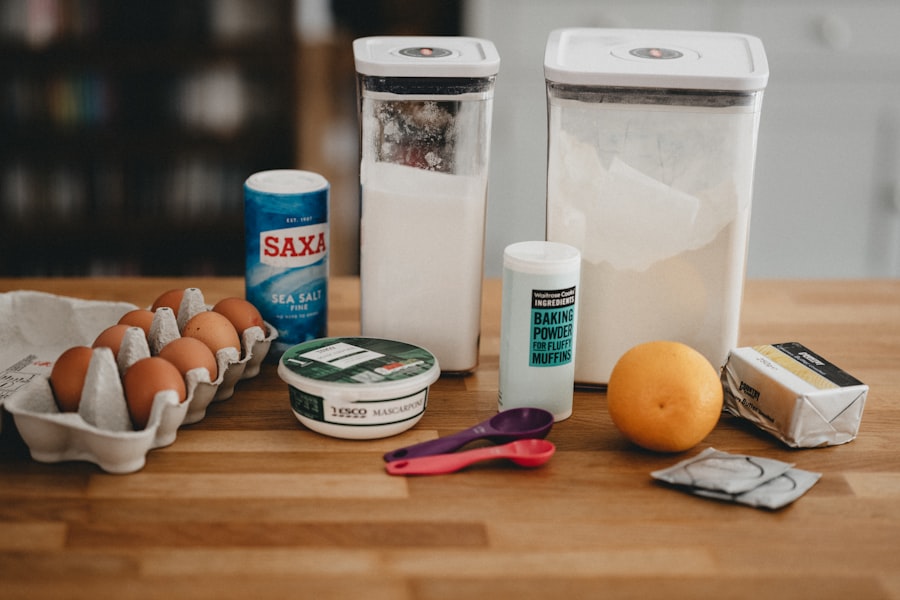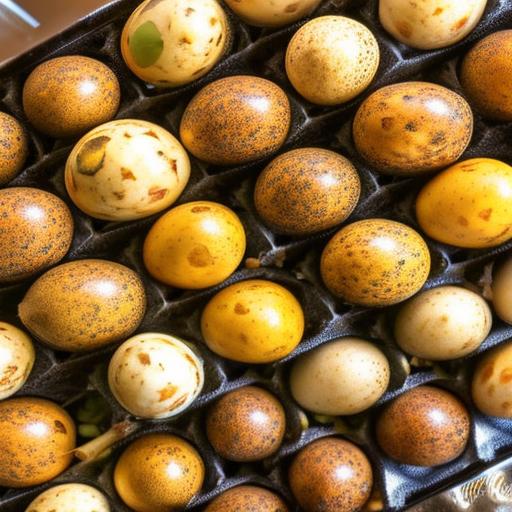Cooked quail eggs have a relatively short shelf life compared to their raw counterparts. When cooked, quail eggs can last for about 1 week in the refrigerator if stored properly. However, it is important to note that the shelf life of cooked quail eggs can vary depending on how they are prepared and stored. Factors such as the method of cooking, the presence of other ingredients, and the temperature at which they are stored can all affect the shelf life of cooked quail eggs.
Cooked quail eggs that are hard-boiled and peeled tend to have a shorter shelf life compared to those that are still in their shells. This is because the removal of the shell exposes the eggs to bacteria and other contaminants, which can lead to spoilage. Additionally, if the cooked quail eggs are mixed with other ingredients such as mayonnaise or other perishable condiments, their shelf life may be further reduced. It is important to take these factors into consideration when determining the shelf life of cooked quail eggs and to always err on the side of caution when it comes to food safety.
Key Takeaways
- Cooked quail eggs have a shelf life of about 1 week when stored properly in the refrigerator.
- Proper storage of cooked quail eggs involves placing them in an airtight container and keeping them refrigerated at all times.
- Signs of spoilage in cooked quail eggs include a sour smell, slimy texture, or discoloration.
- To tell if cooked quail eggs are still safe to eat, check for any signs of spoilage and ensure they have been stored properly.
- Leftover cooked quail eggs can be used in creative ways such as adding them to salads, sandwiches, or as a topping for ramen or noodle dishes.
Proper Storage of Cooked Quail Eggs
Proper storage is key to maximizing the shelf life of cooked quail eggs. After cooking, it is important to cool the quail eggs quickly to prevent the growth of bacteria. Placing the cooked quail eggs in an ice bath or running them under cold water can help to rapidly lower their temperature and inhibit bacterial growth. Once cooled, the cooked quail eggs should be stored in an airtight container in the refrigerator. If the eggs are still in their shells, they can be stored in a bowl of cold water to help maintain their freshness.
It is important to keep cooked quail eggs away from other perishable foods, especially those with strong odors, as they can easily absorb these flavors. Additionally, it is best to store cooked quail eggs on a shelf in the refrigerator rather than in the door, as the temperature on the door shelves tends to fluctuate more. If you have a large quantity of cooked quail eggs, you can also consider freezing them for longer-term storage. Simply place the cooked quail eggs in a freezer-safe container or bag and label them with the date before placing them in the freezer. When properly stored, cooked quail eggs can maintain their quality for up to 3 months in the freezer.
Signs of Spoilage in Cooked Quail Eggs
It is important to be able to recognize the signs of spoilage in cooked quail eggs to ensure that they are safe to eat. One of the first signs of spoilage is a change in color or appearance. Cooked quail eggs that have turned green or gray in color should be discarded, as this is a sign that they have begun to spoil. Additionally, if there is any mold present on the surface of the eggs, they should not be consumed.
Another indicator of spoilage is a foul or off-putting odor. If the cooked quail eggs emit a strong or unpleasant smell, it is best to err on the side of caution and throw them away. Finally, if there are any signs of sliminess or a sticky texture on the surface of the eggs, this is also a clear indication that they have spoiled and should not be eaten.
How to Tell if Cooked Quail Eggs are Still Safe to Eat
While it is important to be cautious when it comes to food safety, there are also ways to determine if cooked quail eggs are still safe to eat. One method is to perform a sensory evaluation by examining the appearance, smell, and texture of the eggs. If the cooked quail eggs appear normal in color and texture and do not emit any unusual odors, they are likely still safe to eat.
Another way to assess the safety of cooked quail eggs is to conduct a taste test. If the eggs taste normal and do not have any off-putting flavors, they are probably still good to consume. However, it is important to remember that these methods are not foolproof and if there is any doubt about the safety of the cooked quail eggs, it is best to discard them.
To further ensure the safety of cooked quail eggs, you can also check for any signs of bacterial growth by examining the surface of the eggs for any unusual discoloration or mold. If there are no visible signs of spoilage and the eggs have been stored properly, they are likely still safe to eat.
Creative Ways to Use Leftover Cooked Quail Eggs
Leftover cooked quail eggs can be used in a variety of creative ways to add flavor and nutrition to your meals. One popular way to use leftover cooked quail eggs is by slicing them and adding them to salads or grain bowls for an extra protein boost. They can also be mashed and mixed with mayonnaise and seasonings to create a delicious egg salad that can be enjoyed on sandwiches or as a dip for vegetables.
Another creative way to use leftover cooked quail eggs is by incorporating them into sushi rolls or bento boxes for a unique twist on traditional Japanese cuisine. They can also be used as a topping for ramen or noodle dishes, adding a rich and creamy texture to the broth.
For those with a sweet tooth, leftover cooked quail eggs can be used in baking recipes such as cakes, muffins, and cookies to add moisture and richness. They can also be used as a garnish for savory dishes such as deviled eggs or as a topping for avocado toast.
Nutritional Benefits of Cooked Quail Eggs

Cooked quail eggs are not only delicious but also packed with essential nutrients that can benefit your overall health. Quail eggs are an excellent source of high-quality protein, containing all nine essential amino acids that are necessary for muscle growth and repair. They are also rich in vitamins and minerals, including vitamin B12, riboflavin, and selenium, which play important roles in energy production and immune function.
In addition, quail eggs are a good source of choline, a nutrient that is important for brain health and development. Choline is also involved in liver function and helps to transport fats and cholesterol out of the liver, which can help prevent fatty liver disease.
Quail eggs are also lower in cholesterol compared to chicken eggs, making them a heart-healthy choice for those looking to manage their cholesterol levels. They are also rich in antioxidants such as lutein and zeaxanthin, which can help protect against age-related macular degeneration and promote eye health.
Tips for Maximizing the Shelf Life of Cooked Quail Eggs
To maximize the shelf life of cooked quail eggs, it is important to follow proper food safety guidelines and storage practices. One key tip is to always store cooked quail eggs in an airtight container in the refrigerator to prevent exposure to bacteria and other contaminants. It is also important to keep them away from other perishable foods and strong-smelling ingredients to avoid flavor absorption.
Another tip for maximizing the shelf life of cooked quail eggs is to cool them quickly after cooking to inhibit bacterial growth. Placing them in an ice bath or running them under cold water can help lower their temperature rapidly and prevent spoilage.
If you have a large quantity of cooked quail eggs, consider freezing them for longer-term storage. Be sure to label them with the date before placing them in the freezer and use them within 3 months for best quality.
By following these tips and guidelines for proper storage and handling, you can ensure that your cooked quail eggs remain safe and delicious for as long as possible.
If you’re wondering how long you can keep cooked quail eggs, it’s important to consider proper storage methods. Storing them in the refrigerator can help maintain their freshness for a longer period. For more tips on keeping your poultry products fresh, check out this informative article on Snaplock Chicken Coop. Understanding the best practices for storing eggs and other poultry products can help ensure that they remain safe and delicious for consumption.
FAQs
How long can you keep cooked quail eggs?
Cooked quail eggs can be kept in the refrigerator for up to 7 days.
How should cooked quail eggs be stored?
Cooked quail eggs should be stored in an airtight container in the refrigerator to maintain their freshness.
Can cooked quail eggs be frozen?
Yes, cooked quail eggs can be frozen for up to 2 months. It is recommended to store them in an airtight container or freezer bag to prevent freezer burn.
How can you tell if cooked quail eggs have gone bad?
If cooked quail eggs develop an off smell, slimy texture, or unusual color, they should be discarded as they may have gone bad.
What are some ways to use cooked quail eggs?
Cooked quail eggs can be used in salads, as a topping for ramen or noodle dishes, or as a protein-packed snack. They can also be pickled or used as a garnish for various dishes.
Meet Walter, the feathered-friend fanatic of Florida! Nestled in the sunshine state, Walter struts through life with his feathered companions, clucking his way to happiness. With a coop that’s fancier than a five-star hotel, he’s the Don Juan of the chicken world. When he’s not teaching his hens to do the cha-cha, you’ll find him in a heated debate with his prized rooster, Sir Clucks-a-Lot. Walter’s poultry passion is no yolk; he’s the sunny-side-up guy you never knew you needed in your flock of friends!







